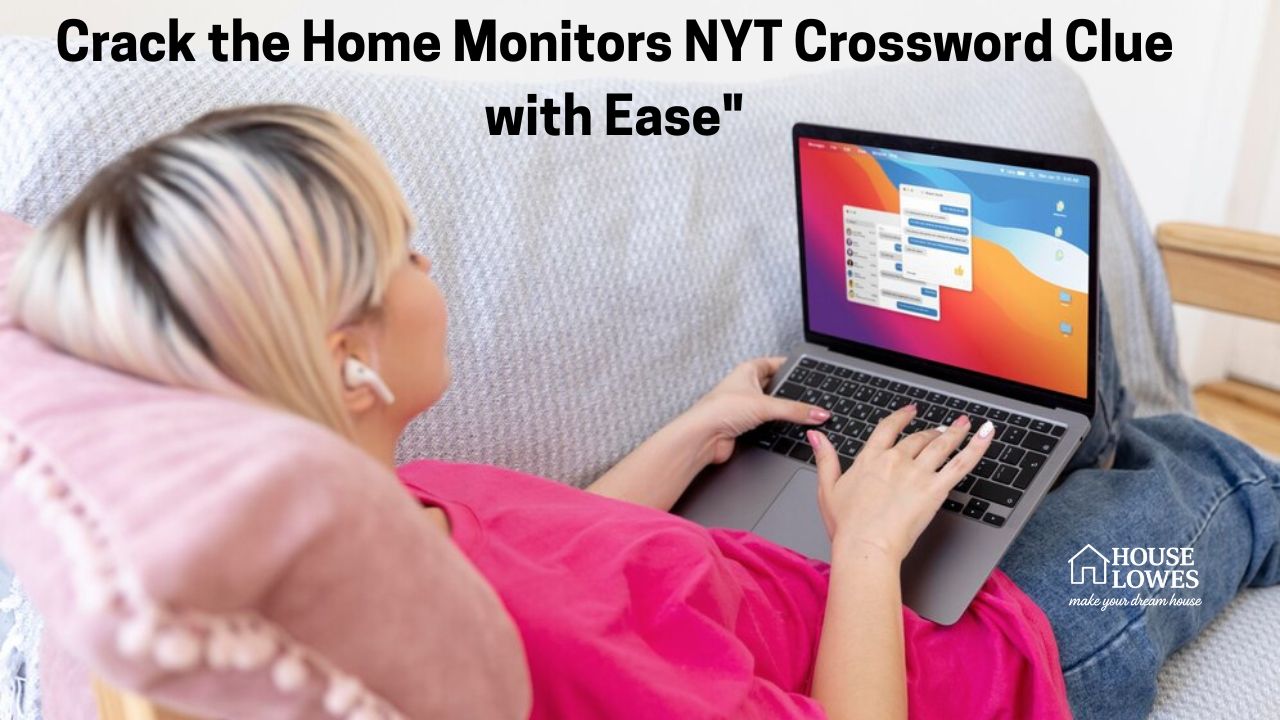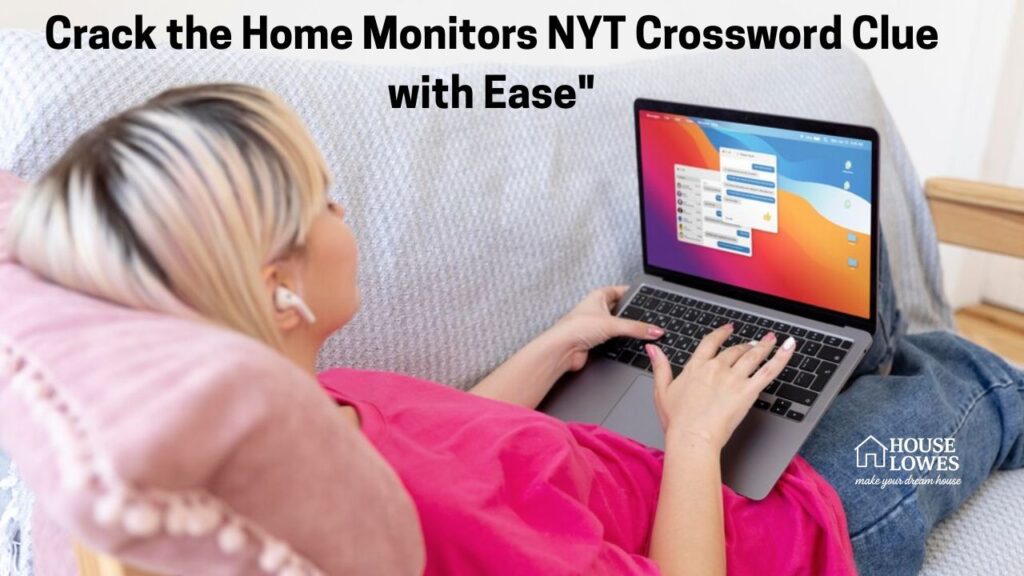Introduction
Have you ever had one of those moments when you’re solving a crossword puzzle, and you’re completely stumped? Like, no matter how much you squint at the clue, the answer just won’t come to you? Puzzles can make you feel like a genius one second and then like you’ve forgotten how words work the next. Well, if you’ve found yourself scratching your head over the “home monitors NYT crossword” clue, take a deep breath. You’re not alone, and I’m here to help.
The beauty of the New York Times crossword puzzle is how it blends challenge with creativity. It’s like a mini treasure hunt for your brain, with cleverly crafted clues and answers that can make you laugh (or groan) once you crack them. But the “home monitors NYT crossword clue”? That has been a real head-scratcher for many. Why? Because it’s deceptively simple yet oh-so-tricky. But don’t worry—I promise to make this not just clear but fun, too.
Why Do NYT Crossword Clues Feel Like Riddles?
Crossword puzzles, especially ones from the New York Times, are like word puzzles disguised as riddles. Instead of straightforward definitions, clues often feature wordplay, double meanings, or subtle hints. When you see “home monitors,” your mind might dart to things like security cameras or home assistants—but what if I told you this clue has absolutely nothing to do with technology? Crazy, right?
This is where the brilliance of crossword design comes into play. The creators (often referred to as constructors) want to keep you guessing. And for “home monitors NYT crossword,” the answer isn’t a device or a gadget but something entirely unexpected. Spoiler alert! It’s “UMPS” (short for “umpires”), as in the referees who monitor home plate in baseball. We’ll break this all down as we go, but doesn’t that already blow your mind a little?
A Quick Glimpse Into Crossword Craziness
Crossword puzzles have been around for over 100 years, evolving from straightforward word grids to these intricately crafted masterpieces we see today. And the New York Times crossword? It’s the gold standard. Solving it isn’t just a pastime; it’s almost a badge of honor. Every clue is carefully designed to make your brain work a little harder while giving you that priceless “Aha!” moment when you figure it out.
For the “home monitors NYT crossword clue,” the trick lies in how you interpret the word “monitors.” Most people think of modern-day home monitoring devices like baby monitors, smart cameras, or motion sensors. Logical, right? But crossword clues love to push you into different directions, hinting at a home of a completely different kind. Baseball, in this case. The home plate, to be exact!
Breathe Easy. Crossword Confusion Happens to Everyone
First of all, if this clue had you stumped, don’t beat yourself up. Crossword puzzles are built to trip you up in the most delightful way possible. Hundreds of thousands of people solve the New York Times crossword every single day, and guess what? Most of them also groan, re-read the clues, and second-guess themselves before they finally fill in an answer.
Here’s the good news, though. Getting stuck isn’t a failure; it’s part of the process. It means your brain is connecting dots, experimenting with possibilities, and doing some creative problem-solving. Plus, when you’ve got experts like me to help guide you through tricky spots like “home monitors NYT crossword,” it makes the experience a lot less stressful (and a lot more fun!).
Why “Home Monitors” Isn’t What You Think It Is
Okay, so you might be wondering, “Why on earth is an umpire monitoring a home?” Don’t umpires stand on baseball fields barking out calls like “Strike!” and “Safe!”? Yes, they do. But in the world of crosswords, every word—even something seemingly mundane like “home”—takes on new life.
Think of “home” here as home plate. If you’ve ever watched a baseball game, you know the umpire is like a guard keeping an eagle eye on every call made around the plate. Throw in “monitor,” and you’ve got the clue’s playful way of pointing us toward someone (an umpire) keeping watch at home. There you go! “UMPS” cracks the crossword!
Not every day do you get to talk about sports and puzzles at the same time, huh? Kudos to whoever thought up this clue. It’s quite a clever word trick. This is why NYT puzzles always stand out.
What Makes Crosswords Like This One Addictive?
Honestly, cracking clues like the home monitors NYT crossword clue is addictive because they give you a sense of accomplishment you can’t really compare to anything else. It’s not about solving for the sake of it; it’s the thrill of discovery. You may enter the puzzle firmly believing that “home monitors” will have you writing in “CCTV” or “alarms,” only to be blindsided by a play on words.
Engaging with these puzzles also makes your vocabulary broader. For example, next time you hear someone say “monitor,” you’ll remember this clue and smile because you’ll have a quirky little detail tucked in your memory bank.
Making Sense of Wordplay for Beginners
If you’re a total newbie to crosswords, clues like this might feel like trying to read a foreign language. That’s totally okay—we’ve all been there. The trick is to think outside the box while also grounding yourself in basic meanings. For instance, know that “home” might not always mean your house, and “monitors” might not refer to something digital.
It’s all about letting the hint lead you. And when in doubt? Guess! The worst thing that can happen is that you get it wrong and learn something new in the process.
Wrapping Up This Puzzle Madness
Crossword puzzles might seem tough at first, but they’re also wildly rewarding. The “home monitors NYT crossword” clue is a perfect example of how a simple pair of words can make our brains work overtime to crack a code. Now you know the trick behind this one, and you’re better equipped to tackle similar puzzles in the future.
Plus, understanding this clue doesn’t just help in crossword puzzles. It’s a little insight into the art of creative thinking, of looking at something from a completely unexpected perspective. And every time you practice that, you’re sharpening your mind.
So, the next time you come across a tricky clue, don’t panic. Remember, it’s supposed to make you think sideways. Grab a pencil, give it a try, and if all else fails, just come back to me for an answer. We’ll solve it together.
Now, are you ready to take on your next crossword challenge with confidence? Keep your brain working, keep smiling, and always keep guessing. You got this!



















